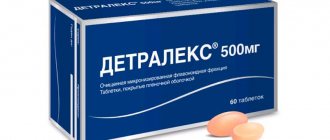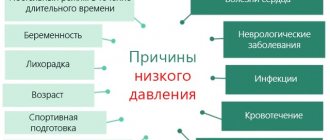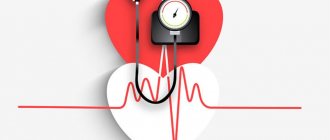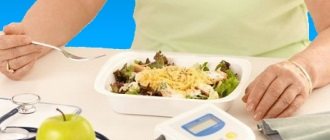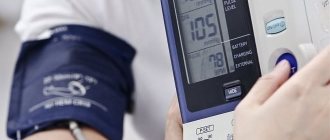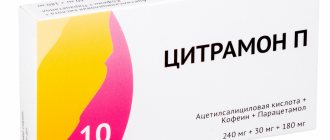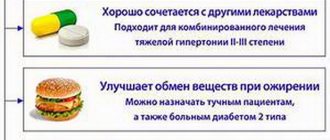Medicines that increase blood pressure are of interest to either hypotensive patients who need to get rid of a symptom, or hypertensive patients who want to prevent an even greater increase in pressure. Hypotension (decreased blood pressure) threatens drowsiness, fatigue (even if a person has slept and rested normally), decreased mental abilities and physical activity. A person becomes drowsy and may sleep longer at night than people with normal blood pressure.
- Non-drug treatments for hypotension
- Medicines for high blood pressure
- Citramon to increase blood pressure
- What does Askofen help with?
- Does Coficil Plus increase blood pressure?
- Does pu-erh increase blood pressure?
- Pressure and Cordiamine
- Does creatine increase blood pressure?
- Does Ketorol increase blood pressure?
- Propolis - for blood pressure?
- Antibiotics and blood pressure
- Ascorbic acid and blood pressure
- Pentalgin - does it lower blood pressure?
- Does Echinacea Increase Blood Pressure?
- Ibuprofen increases blood pressure
- Actovegin for blood pressure
- Pentalgin and blood pressure
Non-drug treatments for hypotension
It is possible to increase blood pressure without medications to some extent, and this measure is purely individual. It is important to walk in the fresh air more often, at least an hour a day, and for pregnant women - at least an hour in the morning/afternoon and an hour in the evening. Sports or physical activity stimulates blood circulation, and accordingly, blood pressure normalizes. Although it is known that professional athletes have slightly lower blood pressure levels than other people.
If you notice problems with blood pressure, it will be useful to take a contrast shower in the morning (alternate cold and hot water). This procedure has its own characteristics, which we will not describe here. To normalize blood pressure, proper nutrition is important. During fasting, the body begins to save resources, temperature and pressure decrease. Sleep should be at least 8 hours a day for teenagers and adults. You should also avoid overwork, both mental and physical equally. Alternate mental and physical activities.
Prevention: diet and healthy lifestyle
The best way to prevent this condition is to lead a healthy lifestyle. Remember to eat a healthy diet, regularly include moderate exercise in your daily routine, and alternate between work and rest.
- Patients are advised to avoid stressful and conflict situations.
- Alcohol consumption should be kept to a minimum and smoking should be avoided completely.
- Night sleep should last at least 9 hours.
- When you wake up, you should take a contrast shower.
- During rest, it is advisable to keep your legs elevated.
- Your diet should include foods that increase blood pressure. In the morning you should drink a caffeinated drink.
Sometimes simple preventive measures are enough to normalize blood pressure or achieve stable remission.
Medicines for high blood pressure
If non-drug methods of increase do not produce results, you need to resort to the use of medications. A common remedy is caffeine sodium benzoate (tablets). This stimulant is known throughout the world and is added to energy drinks. However, they increase blood pressure, but negatively affect the functioning of the gastrointestinal tract. Therefore, drinking energy drinks is not recommended!
Caffeine is also known as trimethylxanthine. This is a powder that has a bitter taste. This substance is also a diuretic; it dilates peripheral blood vessels. It increases blood pressure only for a while. With normal blood pressure, the readings may not change when taking caffeine. You should follow the dosage prescribed by your doctor (or indicated in the instructions for the drug). In large doses, the drug can negatively affect some organs; it is also rare, but it causes addiction.
The second popular remedy is lemongrass tincture. 25 drops are diluted in 100 ml of water. Give to the patient 15 minutes before meals, 2-3 times a day. It is not recommended to take this alcohol infusion at night. If you have insomnia, try using it only in the morning and at lunchtime, and after 16:00 do not drink lemongrass tincture to increase blood pressure.
Ginseng tincture is the third most popular remedy for increasing blood pressure in hypotensive patients. The drug is also believed to strengthen the immune system. Do not use this medicine in the evening as it will make it difficult to fall asleep. This remedy is also not suitable for pregnant and breastfeeding women. One dose delivers an average of 20 drops.
Eleutherococcus is also a popular remedy for raising blood pressure. It relieves accumulated fatigue and is used in frequent stressful situations. After long illnesses, the body is weakened, so the doctor may also prescribe a tincture of Eleutherococcus. But this is not only a tincture; the drug is available in capsules and tablets. There is also dry raw material that is brewed and drunk. The most popular is the liquid extract of Eleutherococcus. Take 1-3 times a day, 15-30 drops (depending on the age and weight of the patient). The course of treatment for hypotension is 30 days.
Leuzea extract normalizes blood pressure, tones the body and strengthens the body's defenses. Thanks to this remedy, the body adapts to heavy loads. Take 1-3 times a day, twenty or thirty drops. This drug is also available in tablet form, take a maximum of 3 times a day, 1-2 tablets.
All the drugs mentioned above stimulate, to a greater or lesser extent, the activity of the heart, blood vessels and nervous system. Thus, after taking one of these drugs, a person’s vascular tone increases, which is why blood pressure increases. Below we will describe how other drugs that people periodically use to treat hypotension affect blood pressure readings.
How to increase blood pressure without using medications
To increase blood pressure, you can use various compositions of traditional medicine. It's good to drink strong black coffee. Caffeine constricts blood vessels, increases tension and eliminates unpleasant symptoms.
Instead of coffee, you can make strong tea.
There is no shortage of herbal ingredients in folk remedies. The list of herbs is extensive: ginseng, eleutherococcus, St. John's wort, aralia, rose hips, lemongrass. They are used as a basis for preparing decoctions, infusions and alcohol tinctures. The main thing is to be able to prepare a medicinal drink.
Herbal collection
Compositions based on several herbal ingredients are considered effective:
- A combination of herbs such as St. John's wort, chamomile and nettle helps. All ingredients are taken in equal quantities and mixed. To prepare the infusion, take 50 g of the mixture and pour boiling water over it. Take up to 120 ml twice daily.
- The composition of St. John's wort, chokeberry, centifolia rosea and Rhodiola rosea improves the condition and normalizes blood pressure. The herbs are poured with boiling water for 40 minutes and left to infuse.
- A collection of mint, eleuthero, lemongrass, aralia and lily of the valley is poured with boiling water and left for 40 minutes. The infusion should be taken in an amount of 70 ml twice a day before meals.
- You can pour boiling water over 60 g of hawthorn fruit, beans, lemongrass and chamomile and leave for 25 minutes. It is recommended to drink 60 ml of the strained infusion before breakfast and dinner.
All ingredients have a positive effect on the cardiovascular system, tone blood vessels, increase blood pressure and improve blood circulation.
Infusion of hawthorn and wormwood
Wormwood and hawthorn help with low blood pressure. Wormwood removes toxins from the body, relieves insomnia and depression, and improves mood. The herb contains a lot of magnesium and potassium, which are good for the heart. Hawthorn eliminates pain, fatigue and gives vigor. An infusion of the two herbs can lower high blood pressure and raise low blood pressure.
You need to mix 20 g of hawthorn berries with dried wormwood leaves in an amount of 5 g and pour a glass of boiling water. Leave the container with herbs to steep for 30 minutes. The infusion of the decoction is drunk three times a day before meals.
Tonic decoction of prickly tartar
A grapevine decoction will give you vigor, relieve apathy, reduce pain, and improve the quality of sleep. Pour dry crushed flowers and leaves of the plant with water, put on fire and cook for 15 minutes from the moment of boiling. Then strain and wrap the container, leaving it for centuries. The finished drink is consumed 40 ml three times a day.
Coffee-honey potion
Use coffee with honey to treat hypotension. You will need to mix 50 g of freshly ground coffee beans with 500 g of honey, you can add lemon juice. It is recommended to take 5 g regardless of meals.
Ginger tea
Ginger contains a rich list of amino acids, micro- and macroelements, essential oils, organic acids and vitamins.
These ingredients can improve blood composition, relax muscles, and improve circulation.
Low blood pressure can be normalized with the ginger tea recipe given below. You should brew strong black tea and add 2.5 g of chopped ginger to it. You should add sugar to tea. Glucose will also make you stronger and improve your mood. Drink this tea on an empty stomach. The duration of treatment is one week.
Ginseng tincture
Ginseng increases mental and physical activity, strengthens the immune system, increases resistance to stress, tones, and relieves the unpleasant symptoms of hypotension.
For low blood pressure, an alcohol tincture is most often prescribed, which can be purchased ready-made at a pharmacy or made independently. Drink 15-20 drops before breakfast and lunch for 2-3 weeks.
To prepare the tincture, you will need 50 g of crushed ginseng roots, pour 500 ml of alcohol. Incubate the product for three weeks in a dark place.
Infusion of immortelle
Immortelle has tonic, antispasmodic, diuretic, anti-inflammatory, analgesic properties, can prevent the formation of cholesterol plaques and increase blood pressure. To prepare an infusion of immortelle, 40 g of dry material is required for boiling and infusing for two hours. Strain the drink, take 70 ml three times a day 35 minutes before meals, cool.
Rapid increase in blood pressure with cinnamon and honey
Cinnamon contains a rich complex of vitamins and minerals necessary for the proper functioning of internal organs. The spice normalizes blood sugar levels, improves blood circulation and has analgesic properties. Drinks with cinnamon lift your tone and add vigor.
Cinnamon in combination with honey has a positive effect on the heart and blood vessels.
It is enough to eat a small portion of honey with a pinch of cinnamon every morning before breakfast. The duration of treatment is two weeks.
Rhodiola rosea tea
The Rhodiola plant normalizes the circulatory system, stimulates mental and muscle activity, and removes toxins from the body.
To prepare tea, you need a liter of boiling water, pour in 5 g of dried crushed leaves of Rhodiola rosea. It is allowed to add raw materials to regular tea infusion. It is allowed to drink up to 5-6 cups of tea per day.
St. John's wort infusion
St. John's wort helps with low blood pressure, so this ingredient is present in many recipes for infusions and decoctions. The herb has tonic properties, reduces anxiety and eliminates irritability, dilates blood vessels and removes excess fluid from the body.
To prepare the infusion, you need to pour 30 grams of crushed raw materials with a liter of boiling water. After 4 hours, strain the infusion and take for 2-3 weeks. The drug should be drunk 100 ml twice a day.
Contraindications to the use of a composition based on St. John's wort are liver disease, persistent arterial hypertension, decreased sexual activity in men, constipation and allergic reactions.
Schisandra tincture
Organic acids, which are part of many lemongrass vitamins, are necessary for the proper functioning of the cardiovascular system. Compositions based on this plant improve mood, tone, relieve fatigue, stimulate mental and physical activity, and normalize metabolic processes in the body.
A tincture can be prepared from the fruits and leaves of the plant:
- To prepare an alcohol tincture, take 40 g of lemongrass berries and add alcohol in a ratio of 2:10. It is recommended to keep the infusion for 10 days in a dark place. Then strain the tincture and pour in a little alcohol again for 10 days. The prepared solution is diluted with water in a ratio of 1: 1. Drink 5 ml twice a day for two weeks.
- The crushed leaves and stems of the plant are poured with alcohol in a ratio of 2: 6. After 10 days, strain the tincture and begin treatment. Take 30 drops twice a day.
Contraindications to the use of lemongrass-based formulations are epilepsy, sleep disorders, hypertension, infectious diseases and liver pathology.
Citramon to increase blood pressure
Citramon contains acetylsalicylic acid, paracetamol and caffeine. The first component thins the blood, the second reduces pain, and caffeine, as already noted, stimulates breathing, nerves and heart activity. It has a positive effect on blood circulation, so the body receives more oxygen. When the pressure normalizes, the person begins to work more actively. It is believed that citramon increases blood pressure. But the content of the invigorating component in this medicine is very small, so you will need 2 tablets, and even then they do not help in all cases.
What does Askofen help with?
The composition of this medicine is similar to Citramon, only different proportions are used. The drug helps relieve pain, inflammation, and it also normalizes the temperature if it is elevated. Due to the fact that it contains caffeine, the effect of which is described above, the excitability of the central nervous system increases, fatigue goes away to some extent, and the person becomes more active. Askofen increases blood pressure if it is low. It should be taken for hypotension in the amount of 2 tablets, but it does not help everyone, and its effect is short-lived (relates to increasing blood pressure). Continuous use of the drug is not recommended.
How to raise blood pressure
Oddly enough, drinking coffee and tea in the morning is not recommended, but it is better to avoid it altogether. The desire to get a “charge of vigor” in the morning first becomes a habit, and then turns into doping and requires a constant increase in the dose1.
Moderate loads with a smooth increase in duration have a positive effect. For example, walking, exercise bike, gentle jogging, skiing, swimming.
Static loads with a forced posture (working at a computer), tilting the head, lifting heavy objects are best avoided. If it is impossible to alternate them with physical activity.
In the morning, you need to learn to get up slowly so as not to cause a drop in blood pressure. Compression stockings on your legs may also help. It will reduce the amount of blood in the veins of the lower extremities. For training, you can sleep with the head of the bed elevated.
It is better to avoid static loads with a forced posture
Does Coficil Plus increase blood pressure?
This drug is sometimes prescribed instead of askofen and citramon. It also contains paracetamol, aspirin and caffeine. Coficil Plus relieves pain and inflammation, and also has psychostimulating activity. This medicine increases blood pressure, again due to the presence of caffeine in its composition.
Coficil Plus should be taken after meals in the amount of 1-2 tablets. You can take no more than six tablets per day. The course lasts up to 5 days. With longer use, a negative effect on the organs and systems of the body is likely. If you take too many pills, you may experience heart palpitations, short-term hypertension, and tinnitus. To get rid of this condition, sorbents are used. Coficil Plus should not be taken to lower blood pressure!
Products that affect blood pressure
Not only medications, disturbances in the functioning of certain organs and experiences, but also food products available in almost every refrigerator can increase or decrease blood pressure:
- Ginger. It relieves vascular spasm, making them more elastic and pliable in response to the influence of blood flow, as well as to temperature conditions. If the vessels can dilate in a timely and uniform manner, this will not cause high blood pressure on their walls.
- Garlic not only thins the blood and helps fight blood clots, but also helps lower blood pressure.
- Lemon, containing a large amount of vitamin C, provides the walls of the blood flow system with a reliable building material, due to which arteries, veins and blood vessels gain strength and elasticity.
People suffering from hypertension need to give up chocolates in particular and sweets in general. The sharp release of energy that occurs when consuming glucose also provokes a jump in blood pressure. You can eat dessert, but only on a full stomach, and in moderation.
Does pu-erh increase blood pressure?
Pu-erh is a dark variety of tea, but not black, as the manufacturing technology is different. Budget options for this tea are ready-made Pu-erh (Shu) and raw Pu-erh (Shen). At reduced pressure, the second of them is used. Thanks to it, the body’s tissues receive more nutrition, and digestion is normalized to some extent.
Shu Pu'er should not be drunk in large quantities. It lowers cholesterol in the blood, is used to prevent vascular and heart diseases, and removes harmful substances and toxins from the body. Pu-erh increases blood pressure, so if the norm is exceeded, short-term hypertension may occur. To avoid affecting blood pressure, drink it not so strong or in the amount of 1-2 cups per day. It is better to avoid consumption at night.
Low blood pressure: causes and symptoms
Hypotension is usually said to occur when blood pressure remains below the limit of 100 at 59 mm Hg. Art. For a certain period of time. The disease is accompanied by a decrease in blood circulation in the body. As a result, internal organs experience a lack of oxygen and nutrients. The structures of the heart and brain are especially affected.
If blood pressure is kept below 75 to 45 mm Hg. Art., this is moderate hypotension. Severe hypotension occurs when blood pressure drops to 65 to 39 mmHg.
The following triggers can cause low blood pressure in adults:
- dehydration as a result of poisoning, overheating, increased sweating;
- loss of large amounts of blood;
- Vascular dystonia;
- endocrine diseases;
- severe anemia;
- exacerbation of allergic reactions;
- Low blood pressure may be associated with heart disease;
- infectious and inflammatory diseases;
- decreased vascular tone as a result of stress, overwork, hot weather.
With low blood pressure, the following unpleasant symptoms occur:
- dizziness and pressing, pressing pain in the back of the head, forehead, temples;
- persistent weakness, drowsiness, lethargy;
- nausea and repeated vomiting;
- deterioration of hearing and visual acuity;
- lack of coordination;
- changes in heart rate;
- pale skin.
If you experience any of these symptoms, contact your doctor. Additional tests may be needed to determine the cause of the abnormal condition.
Pressure and Cordiamine
The drug is an analeptic; it stimulates the CENS and chemoreceptors. This medicine increases your blood pressure. Breathing, accordingly, becomes more frequent and deeper, consciousness becomes clearer. Cordiamine can be used in case of a sharp decrease in blood pressure, for example, with suffocation or fainting.
Cordiamine is available in drops that need to be taken orally. Also available as a solution that is administered by injection. You need to take drops 1-3 times a day, 20-40 drops. And by injection (into the muscles, into the veins) it is administered in an amount of 1 to 2 ml. Among the side effects caused by overdose, researchers name overexcitement and seizures. You cannot prescribe this drug to yourself!
Possible complications and adverse reactions from taking medications
Each drug taken can cause side effects, especially if the recommended doses and duration of use are not followed:
- Most drugs have a negative effect on the gastrointestinal tract. Nausea, vomiting, loose stools, and decreased or increased appetite may occur.
- The tablets may cause heart rhythm problems.
- Side effects include allergic reactions such as rash, redness and itching of the skin.
- Convulsive syndrome develops.
- Nervous excitability appears and sleep is disturbed.
Almost all antihypertensive drugs are prohibited for use in pregnant women due to the risk of increased uterine tone and miscarriage.
Does creatine increase blood pressure?
Creatine is an amino acid that athletes take as a supplement. Creatine increases endurance and is used for more active muscle building. The feeling of fatigue when taking creatine becomes less, so workouts can be more intense, etc.
Creatine retains some fluid in the body, which is why it presumably increases blood pressure. But this only occurs in a small percentage of people. For others, urine output and blood pressure remain unchanged. To prevent blood pressure from increasing with constant use of creatine, it is better not to drink strong tea (including pu-erh) and coffee during this period.
Does Ketorol increase blood pressure?
Ketorol relieves inflammation and pain. Refers to non-steroidal drugs. The active ingredient of this medicine is ketorolac. Ketorol is available in tablets and liquid for injection. When taking the medicine, a slight increase in blood pressure may occur. But this only happens if a person is prone to hypertension. Ketorol cannot be combined with drugs that lower blood pressure, as well as with diuretics, because taking Ketorol will reduce their effectiveness.
Ways to lower pressure
Before taking any measures, you need to make sure that the malaise is associated with high blood pressure. Therefore, anyone who suffers from frequent headaches, sleep disturbances or loss of strength needs to have a tonometer at home - a device that measures blood pressure. Headache and general weakness can occur with both low and high blood pressure. Taking the wrong medication can be a fatal mistake.
Pharmaceutical companies produce many drugs that can normalize blood pressure. Most of them are analogues of each other, so it is important to pay attention not to the name of the drug, but to the active substance underlying the medication.
Self-administration of blood pressure-lowering pills is unacceptable, because it is important to know what exactly caused the increase in blood pressure. Among the variety of drugs, it is important to choose one that will return the tonometer readings to the acceptable limits of the norm, having a beneficial effect on the cause of the jump. Universal drugs that knock down the tonometer column by several points can be taken only as a last resort, when it is not possible to obtain prompt consultation or the patient’s condition is extremely dangerous: the upper indicator tends to 180-190mm.
When a doctor diagnoses hypertension and prescribes taking the drug in a certain dosage, the prescription cannot be ignored. Such patients are forced to take pills to lower their blood pressure every day at a certain time in order to keep their blood pressure levels within normal limits. A single missed dose of the drug will lead to an immediate attack of hypertension.
For patients with nephritis and other renal dysfunction, it is important to remember that almost all diuretics sharply reduce blood pressure. Therefore, the use of diuretics by hypotensive patients should be under the supervision of a specialist.
Propolis - for blood pressure?
Propolis is produced by bees from resinous substances collected from plants. This is a useful substance that has antiviral, antibacterial, anti-inflammatory effects, etc. Propolis helps relieve fatigue and increase activity.
Researchers from Bulgaria wondered about the effect of propolis on human blood pressure. The experiment involved people with hypertension who were diagnosed with this disease 4-5 years ago. They were placed in a hospital, where they must remain without taking medications that affect blood pressure. Next, propolis (30% alcohol solution) was prescribed for treatment. It was given to patients 40 drops 3 times a day, an hour before meals. After the experiment, the patients experienced symptoms such as headaches, no more noise in their ears, no more heart problems, etc. In ¾ of the patients, the blood pressure returned to normal. But in one quarter of the subjects, blood pressure remained at approximately the same level as before the start of the tests. From this they conclude that propolis reduces blood pressure.
Medicines that increase blood pressure
Home Medical encyclopedia Medicines Cardiovascular medicines
Medicines used to correct a sharp drop in blood pressureSee also adrenaline.
ANGIOTENSINAMIDE (Angiotensinamidum)
lL-Asparagyl-5-b-valylangiotensin
Synonyms: Hypertensin.
Pharmachologic effect. It has a pressor (increasing blood pressure) effect due to an increase in peripheral vascular resistance, especially small-caliber arterioles, is capable of contracting the smooth muscles of the uterus, intestines, urinary and gall bladder, increases the secretion of aldosterone and increases the release of catecholamines.
Indications for use. Shock state, especially with isovolumic shock (without massive blood loss) associated with vasomotor collapse (a sharp drop in blood pressure due to vasodilation) - post-traumatic and postoperative shock, shock during intoxication, coma and infectious diseases, as well as with myocardial infarction, cardiac tamponade ( compression of the heart by blood or fluid accumulated in the pericardial sac), massive pulmonary embolism (blockage of the pulmonary artery), etc.
Method of administration and dose. Administered intravenously at an initial rate of 5-20 mcg/min. In severe cases, the initial rate may be 50-60 mcg/min. When the systolic (“upper”) blood pressure reaches 90-110 mmHg. Art. the infusion rate is reduced to 1-3 mcg/min depending on the patient’s condition. The drug can be administered long-term (over many hours or several days).
Side effect. Bradycardia (rare pulse), which is stopped (removed) by atropine.
Contraindications. Hypovolemic shock (shock occurring against the background of a sharp drop in circulating blood volume). Caution should be exercised in patients with cardiac arrhythmias.
Release form. Angiotensinamide lyophilized form (dosage form dehydrated by freezing in a vacuum) 0.001 g (1 mg) for injection.
Storage conditions. List B. In a place protected from light.
HEPTAMIL (Geptamil)
Pharmachologic effect. It is a highly effective and non-toxic remedy that increases the tone of the cardiovascular system. It has a pronounced cardiotonic (increasing the force of heart contractions) effect, increases cardiac output, coronary (heart) blood flow, tones the peripheral circulatory system, returns deposits
fused blood into the arterial system without causing significant vasoconstriction.
Indications for use. Shock, collapse (sharp drop in blood pressure), myocardial infarction, heart failure of any degree (acute and congestive), hypotension (low blood pressure), asthenia (weakness), fainting, cor pulmonale, cardiovascular failure in the elderly, “neuroleptic syndrome” caused by taking antipsychotics (a condition caused by inhibition of the functions of the central nervous system under the influence of antipsychotics).
Method of administration and dose. In case of shock, collapse and other cases of a sharp drop in blood pressure, 2 ampoules of heptamyl are prescribed intravenously. If necessary, intravenous infusion is repeated using the stream and drip method. 1-2 ampoules are administered intramuscularly, and if necessary, increase to 5 ampoules. In cases of neonatal resuscitation, the drug is administered in an amount of 2 ml directly into the umbilical cord.
Orally for hypotension and asthenia, adults are prescribed 2 tablets (or 30 drops) 3 times a day; children - from 10 to 40 drops per day, depending on age.
Contraindications. Hypovolemic shock (shock occurring against the background of a sharp drop in circulating blood volume). Caution should be exercised in patients with cardiac arrhythmias.
Release form. Ampoules of 313 mg in 5 ml of solution; tablets 50 mg; bottles with 40 ml of solution (drops).
Storage conditions. List B. In a dry place, protected from light.
DOPAMINE (Dophaminum)
Synonyms: Dopamine, Dopmin, Aprical, Cardiosteril, Dopamex, Dophan, Dinatra, Hydroxytyramine, Intropin, Revivan.
Pharmachologic effect. It has a specific effect on dopaminergic receptors. Under the influence of dopamine, peripheral vascular tone increases and blood pressure increases. However, this decreases renal vascular resistance and increases renal blood flow, which leads to an increase in renal filtration
Indications for use. Shock conditions caused by various reasons: cardiogenic, traumatic, endotoxic, postoperative, hypovolemic shock, etc. Due to a lesser effect on peripheral vascular resistance, an increase in renal blood flow and blood flow in other internal
organs and other features, dopamine is considered more indicated in these cases than norepinephrine and other catecholamines.
Dopamine is also used to improve hemodynamics in acute cardiac and vascular failure that develops in various pathological conditions.
Method of administration and dose. Administered intravenously; 25 or 200 mg of the drug are diluted, respectively, in 125 or 400 ml of 5% glucose solution or isotonic sodium chloride solution (the dopamine content in 1 ml is 200 or 500 mcg, respectively).
The initial rate of administration is 1-5 mcg/kg per minute (2-11 drops of a 0.05% solution). If necessary, the rate of administration is increased to 10-25 mcg/kg per minute (average 18 mcg/kg per minute).
The infusion is carried out continuously for 2-3 hours to 1-4 days. The daily dose reaches 400-800 mg.
The effect of the drug occurs quickly and ceases 5-10 minutes after the end of administration.
The optimal dose must be selected in each individual case under constant monitoring of hemodynamics and electrocardiogram.
Side effect. Large doses cause spasm (sharp narrowing of the lumen) of peripheral vessels, tachycardia (increased heart rate), ventricular extrasystole, the appearance of junctional rhythm (heart rhythm disturbances), angina pain, respiratory failure, headache, psychomotor agitation and other signs of adrenomimetic action.
Contraindications. Pheochromocytoma (adrenal tumor). It should not be prescribed for arrhythmia in combination with monoamine oxidase inhibitors, cyclopropane and halogenated anesthetics (fluorothane, trichlorethylene).
Release form. 0.5% or 4% solution in ampoules of 5 ml (25 or 200 mg of dopamine).
Storage conditions. List B: In a place protected from light.
CORDIAMIN (Cordiaminum)
Synonyms: Niketamide.
Pharmachologic effect. A stimulant of the central nervous system, stimulates the respiratory and vasomotor centers.
Indications for use. Acute and chronic circulatory disorders, collapse (sharp drop in blood pressure) and asphyxia (breathing failure) in shock, asphyxia (lack of breathing) in newborns, poisoning with sleeping pills, narcotic analgesics.
Method of administration and dose. Intravenously (slowly) 0.5-2.0 ml 2-3 times a day. For children, 0.1-0.75 ml subcutaneously, depending on age. For poisoning with sleeping pills, drugs, agalgesics (painkillers), intravenously (slowly) up to 3-5 ml.
Higher doses: parenterally (bypassing the digestive tract) single - 2 ml, daily - 6 ml.
Side effects and contraindications
Release form. In bottles of 15 ml; ampoules of 1 ml and 2 ml, in a package of 10 pieces.
Storage conditions. List B. In a place protected from light.
MEZATON (Mesatonum)
Synonyms: Phenylephrine hydrochloride, Adrianol, Almefrin, Derisen, Idrianol, Isofrin, Neofrin, Neo-Synephrine, M-Sympatol, Vizadrone, etc.
Pharmachologic effect. Adrenomimetic agent. Stimulates alpha-adrenergic receptors, has a weak effect on beta-receptors of the heart.
Indications for use. Hypotension (low blood pressure).
Method of administration and dose. In case of collapse (sharp drop in blood pressure), 0.3-1 ml of a 1% solution in 40 ml of a 40% glucose solution is administered intravenously slowly under blood pressure control. If long-term use is necessary, 1.0 ml of a 1% solution in 250-500 ml of a 5% glucose solution is administered intravenously.
Side effect. Headache, nausea (with increased blood pressure).
Contraindications. Severe atherosclerosis. Particular caution is required in case of hyperthyroidism (disease of the thyroid gland), a tendency to vasospasm (sharp narrowing of the lumen of blood vessels), as well as in the elderly.
Release form. Powder, ampoules of 1 ml of 1% solution, 10 pieces in a package.
Storage conditions. List B. In a place protected from light; powder in well-sealed orange glass jars.
NORADRENALINE HYDROTARTTRAT (Noradrenalinihydrotartras)
Synonyms: Levarterenol bitartrate, Arterenol, Levarterenol, Levofed, Norarthrinal, Norepinephrine, Norexadrin, etc.
Pharmachologic effect. Stimulates predominantly alpha-adrenergic receptors. Compared to adrenaline, it has a stronger vasopressor (constricting blood vessels) effect and stimulates heart contractions to a lesser extent; has a weak bronchodilator (dilates the lumen of the bronchi) effect.
Indications for use. An acute drop in blood pressure due to injuries, surgical interventions, poisoning, moderate cardiogenic shock, sometimes with internal bleeding, etc.
Method of administration and dose. Intravenously (drip) 2-4 mg of the drug (1-2 ml of 0.2% solution) in 500 ml of 5% glucose solution (under blood pressure control).
Side effect. With rapid administration, nausea, headache, chills, palpitations; when it gets under the skin, necrosis (tissue death) occurs, so constant monitoring of the position of the needle in the vein is necessary. If norepinephrine gets under the skin, 5-10 mg of phentolamine is administered in 10 ml of saline.
Contraindications. With chloroform, fluorotane, cyclopropane anesthesia. Caution is necessary in case of severe atherosclerosis, circulatory failure, complete atrioventricular block (impaired conduction of excitation through the heart).
Release form. 1 ml of 0.2% solution in ampoules in a package of 6 pieces.
Storage conditions. List B. In a place protected from light.
FETANOL (Phetanolum)
Synonyms: Etilephrine, Ethyladrianol, Circulan, Effontil, Effortil, Etifillin, Curtazin, Pressoton, etc.
Pharmachologic effect. In terms of its chemical structure and effect on the body, it is close to mesatone; it increases blood pressure to a lesser extent, but for a longer period.
Indications for use. Hypotension (low blood pressure) of various origins, shock, collapse (sharp drop in blood pressure).
Method of administration and dose. Orally 5 mg 2-3 times a day if necessary for several weeks. Parenteral: 1 ml of 1% solution under the skin, intramuscularly or slowly into a vein. It can be administered dropwise into a vein in a 5% glucose solution or in an isotonic sodium chloride solution (at the rate of 1 ml of a 1% fethanol solution per 100 ml of solution; a total of up to 300 ml is administered, i.e. 30 mg of the drug); injection rate is 60-80 drops per minute.
Young children are prescribed orally 0.00125-0.0025 g 0/4-'/2 tablets) 2-3 times a day; 0.1-0.4 ml of a 1% solution is injected under the skin.
For older children, give orally 0.0025-0.005 g 0/2-1 tablet) 2-3 times a day; 0.4-0.7 ml of a 1% solution is injected under the skin.
Side effect. With rapid intravenous administration, headache.
Contraindications. Severe atherosclerosis, hypertension (persistent rise in blood pressure). Particular caution is required if you are prone to vasospasms (spasms - a sharp narrowing of the lumen of blood vessels).
Release form. Powder; tablets of 0.005 g in a package of 20 pieces; in ampoules of 1 ml of 1% solution in a package of 10 pieces.
Storage conditions. List B. In a place protected from light.
EPHEDRINE HYDROCHLORIDE (Ephedrinihydrochloridum)
Synonyms: Ephedrine hydrochloride, Efalon, Ephedrozan, Neo-Phedrin, Sanedrin, Efetonin, etc.
Pharmachologic effect. Alpha and beta adrenergic receptor stimulator. Compared to adrenaline, it has a weaker effect, but lasts longer.
Indications for use. Arterial hypotension (low blood pressure), poisoning with sleeping pills and drugs.
Method of administration and dose. Into a vein slowly (0.5-1 ml of 5% solution) and drip (2 ml of 5% solution in 500 ml of 5% glucose solution or isotonic sodium chloride solution). 0.02-0.05 g is injected under the skin and into the muscle 2-3 times a day.
Side effect. Palpitations, nausea, trembling of limbs, increased sweating, insomnia, nervous agitation, urinary retention.
Contraindications. Insomnia, severe arterial hypertension (persistent rise in blood pressure), severe atherosclerosis, hyperthyroidism (thyroid disease). Special caution is required in case of organic heart diseases.
Release form. Powder; tablets of 0.025 g in a package of 10 pieces; ampoules of 1 ml of 5% solution in a package of 10 pieces.
Storage conditions. List B. In a place protected from light; powder - in a well-closed container.
| print version | This information is not a guide to self-treatment. A doctor's consultation is required. |
Antibiotics and blood pressure
Antibiotics today treat most infectious diseases. Antibacterial drugs do not affect the activity of the heart and the condition of blood vessels if taken as prescribed by the doctor. If you drink alcohol during a course of antibiotics, the toxic effect of the drugs on the body is likely to increase. Death as a result of such negligence with one’s own body is also possible. The combination of alcohol and drugs can greatly increase blood pressure, make it difficult to breathe, and slow down your heart function. The load on the liver also increases, which affects blood pressure levels.
Hypotension and features of its treatment
If a patient consults a doctor with complaints of low blood pressure and malaise, he will need to have an ECG, ultrasound of the abdominal cavity, blood vessels, heart and brain, take biochemical and general blood tests, and examine blood sugar levels. Consultation with a cardiologist, endocrinologist, or therapist is required. Based on the examination results, the doctor determines further treatment tactics individually for each patient.
Most blood pressure pills contain caffeine.
Don't overindulge in caffeine as it can have the opposite effect and make your symptoms worse.
Nootropic drugs can increase body tone, reduce the oxygen demand of organs and restore their functions. Brain stimulating pills are also prescribed.
Ascorbic acid and blood pressure
Ascorbic acid (vitamin C) affects blood clotting and capillary permeability. This drug may increase blood pressure in some people. If you self-medicate, exceed the frequency of use or dosage of the medicine, it is likely that your blood pressure will increase and kidney function will be impaired. An increase in blood pressure when taking ascorbic acid is considered a side effect. Vitamin C is not prescribed to influence blood pressure.
Symptoms of hypotension
The symptoms that occur are usually caused by a lack of blood supply to the brain and heart. Here are typical manifestations1:
- headache;
- dizziness, imbalance;
- nausea;
- severe weakness;
- memory impairment;
- decreased performance;
- intolerance to bright light, harsh sounds, stuffiness.
Deterioration in health is accompanied by pain in the heart, rapid or slow heartbeat, and rhythm disturbances.
As soon as such a person gets out of bed in the morning and starts walking, he feels worse due to an even greater decrease in blood pressure, so he wants to go back to bed. Additional symptoms:
- coldness and impaired sensitivity of the extremities (fingers);
- symptoms worsen due to fatigue, stress, lack of sleep, acute infections and exacerbation of any chronic diseases.
Pentalgin - does it lower blood pressure?
This is a drug for pain, which contains naproxen, paracetamol, drotaverine, caffeine, pheniramine. If the pressure is normal or below normal, the values on the tonometer will not change when taking Pentalgin. Since the drug contains caffeine, the blood vessels may narrow, which means that the pressure will not increase by much. In severe hypertension, the drug is contraindicated.
Pentalgin increases blood pressure if taken in excess of the norm or for long courses. You can take no more than 4 tablets per day, and the duration of the course is a maximum of 5 days.
Does Echinacea Increase Blood Pressure?
Echinacea is a natural herbal remedy. It is used mainly to relieve inflammation and strengthen the body's defenses. Also, medicines based on echinacea improve metabolic processes. If you use these medications for a long time or in large quantities, side effects may occur:
- excitability of the central nervous system
- irritability
- dizziness
- difficulty falling asleep
- increased blood pressure
Echinacea should not be prescribed to patients with collagenosis, blood diseases, autoimmune diseases, or to pregnant women. You can find out other contraindications from the instructions for a particular drug.
How to choose the right one
Usually, medications that can increase blood pressure are recommended by a cardiologist, based on the diagnostic results obtained, after the causes of hypotension have been identified. You cannot prescribe medications for yourself, because each of them has a list of contraindications and side effects that a person may not be aware of and will only aggravate the problem. Particular care should be taken when choosing which tablets are suitable in a particular case for women during pregnancy and breastfeeding. For them, plant-based products are usually selected that do not have side effects and help improve well-being.
In old age, medications that not only increase blood pressure levels, but also have a beneficial effect on the condition of the heart and blood vessels, are more suitable. From a number of tablets, those that do not provoke sudden increases in heart rate are selected, since this condition threatens a number of complications. An unexpected reaction of the cardiovascular system can lead to the opposite effect - this is increased blood pressure in general or the appearance of an abnormal difference between the upper (systolic) and lower (diastolic) pressure.
No ads 1
Ibuprofen increases blood pressure
Ibuprofen is classified as an anti-inflammatory non-steroidal drug. It normalizes body temperature and relieves pain; in this regard, it is better to use this particular medicine than aspirin. Ibuprofen can increase blood pressure, since this is a side effect that occurs in some cases when taking the drug in question. It should be prescribed with caution to patients with impaired liver function. Because Ibuprofen increases the toxic load on this organ, which may cause portal hypertension. The drug is not used to treat hypotension!
High blood pressure danger
A hypertensive crisis (high blood pressure or BP) is a condition when blood pressure rises quickly and sharply, with readings of 180/120 or higher. The consequences of uncontrolled blood pressure in this range can be serious and include:
- stroke;
- loss of consciousness with dangerous injuries;
- memory loss;
- acute cardiovascular diseases;
- eye damage and visual disturbances;
- loss of kidney function;
- aortic dissection;
- angina pectoris (unstable chest pain);
- Pulmonary edema (fluid reserve in the lungs).
If you have been diagnosed with high blood pressure, monitor your readings and take your medications. During an emergency, having the notes with you can provide valuable information to the medical team providing treatment.
Actovegin for blood pressure
Actovegin improves tissue nutrition and affects reparative processes. It is prescribed for encephalopathy, ischemic stroke, neurological diseases, etc. Actovegin does not increase blood pressure, and in some cases it can reduce it. The drug can be prescribed for cerebral vascular hypertension, because its active ingredients moderately dilate blood vessels. In severe hypertension, Actovegin is part of systemic therapy and is administered intravenously.
Symptoms of high blood pressure
High blood pressure is often called the "silent killer" because in most cases it causes no symptoms. The only way to find out if it is there is to measure it with a tonometer. High blood pressure can sometimes be accompanied by one or more of the following symptoms:
- Strong headache;
- dyspnea;
- dizziness;
- nosebleeds;
- severe anxiety.
Usually the headache is in the back of the head; during crises, one often feels dizzy and is accompanied by nausea and vomiting.
Pentalgin and blood pressure
Pentalgin is taken to relieve pain, inflammation, and the drug also has an antispasmodic and fever-reducing effect. It contains paracetamol, naproxen, caffeine, drotaverine, pheniramine, etc. It is recommended to use 1 tablet per day. One tablet contains 50 mg of caffeine, which may increase blood pressure. But drotaverine dilates blood vessels, so the pressure generally remains normal. Pentalgin may increase your blood pressure if it is below normal when you take the drug. But pressure indicators change only after taking 2 tablets at a time. The medicine is not used to treat hypotension.
Don't wonder which medications increase blood pressure. Consult a doctor who will help eliminate the cause of this symptom, and you will not have to spend money on medications and poison your body with unknown drugs. Before taking medications that increase blood pressure, you need to double check your blood pressure monitor.
Who needs blood pressure medications?
Medicines to increase blood pressure are indicated for people diagnosed with hypotension or vegetative-vascular dystonia. This pathology is manifested by consistently low blood pressure levels, increased fatigue, decreased performance, headaches, and increased heart rate during periods of exacerbations. Hypotonic people are sensitive to weather changes; on such days they feel tired, suffer from dizziness and need the help of medications to increase blood pressure
Of course, you can get by with the means at hand (drink coffee, take a horizontal position with your legs up), but a person does not always have such an opportunity. Which drugs are best for a particular patient depends on several factors. These are age, weight, frequency of exacerbations of vegetative-vascular dystonia and severity of symptoms of the disease. Thus, there are two types of arterial hypotension:
- Primary – develops against the background of a person’s predisposition to the disease. This includes structural features of the body and hereditary factors. For example, thin and petite people (usually women) suffer from severe manifestations of vegetative-vascular dystonia.
- Secondary - occurs against the background of concomitant diseases in the form of a complication, for example, with chronic pathologies of the liver, gastrointestinal tract and even allergic predisposition.
A cardiologist, neurologist, or therapist should select pills that increase blood pressure for such patients (depending on what triggered the development of vegetative-vascular dystonia). Primary hypotension is treated by a therapist and a neurologist, since it often develops due to disorders of the nervous system and general health problems.
Drug therapy in patients with low blood pressure should always begin with a visit to the clinic and examination by specialists
